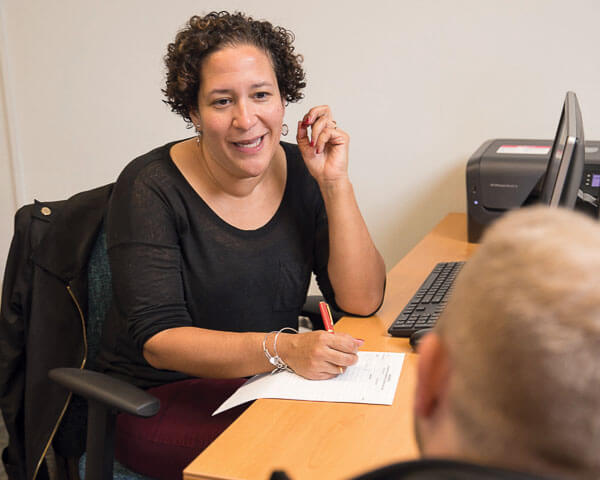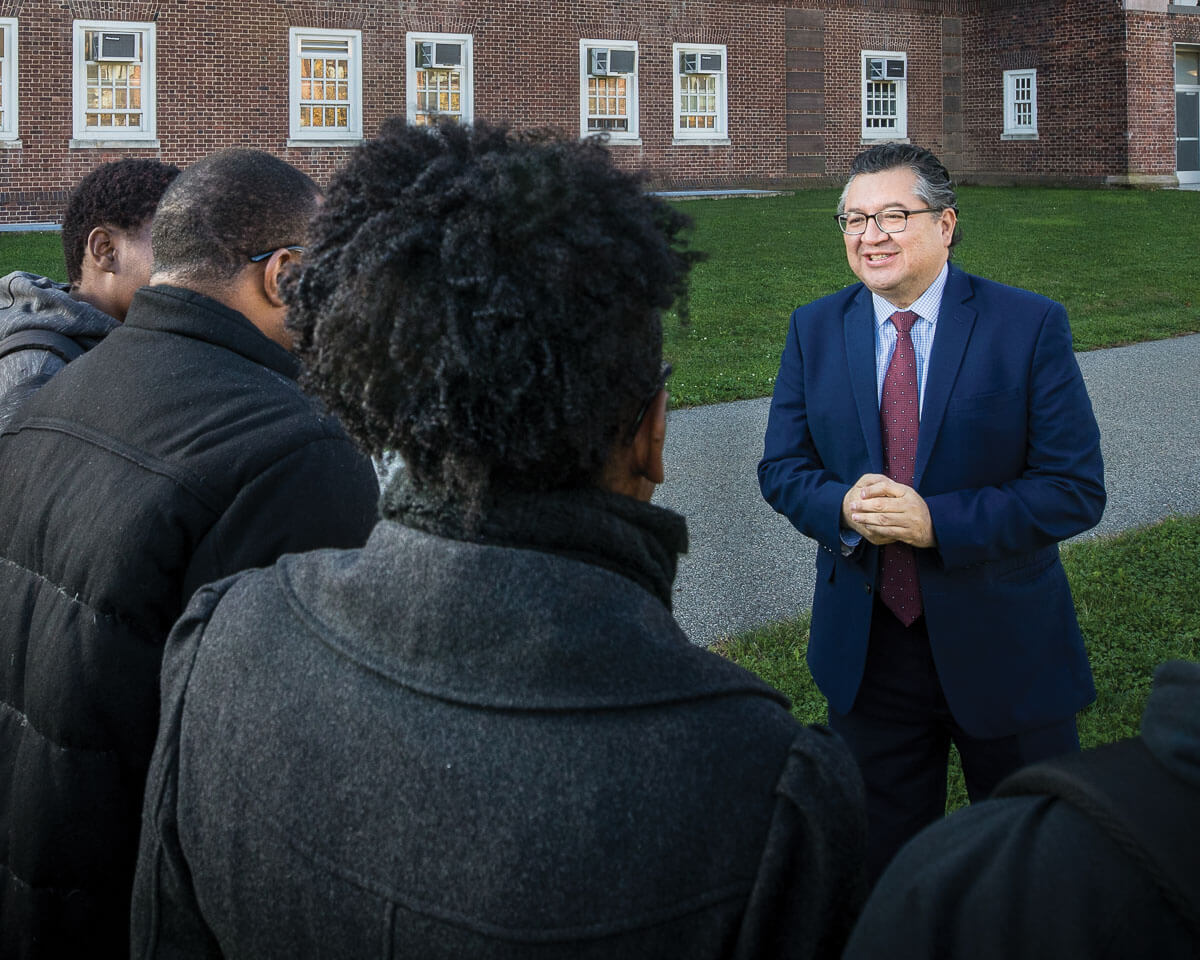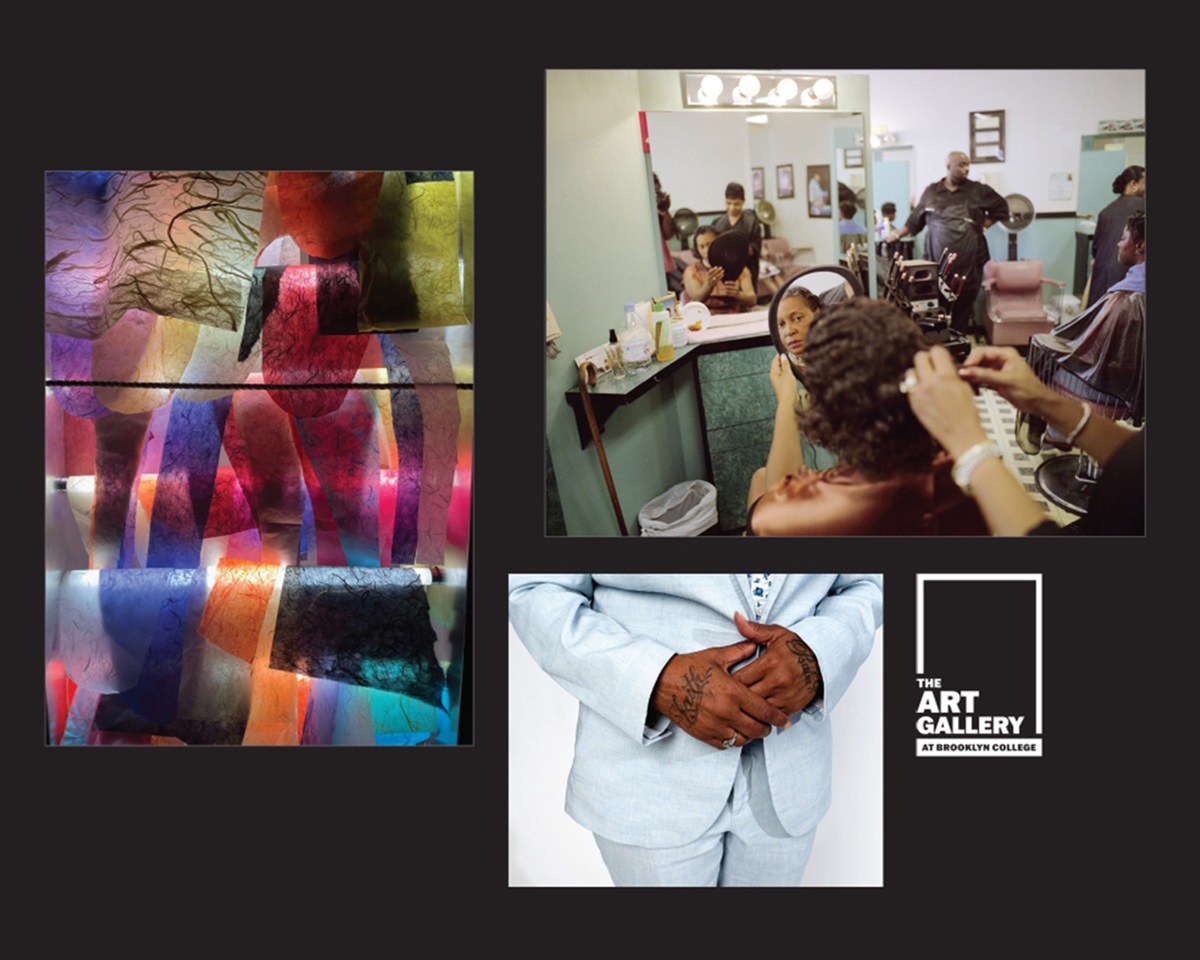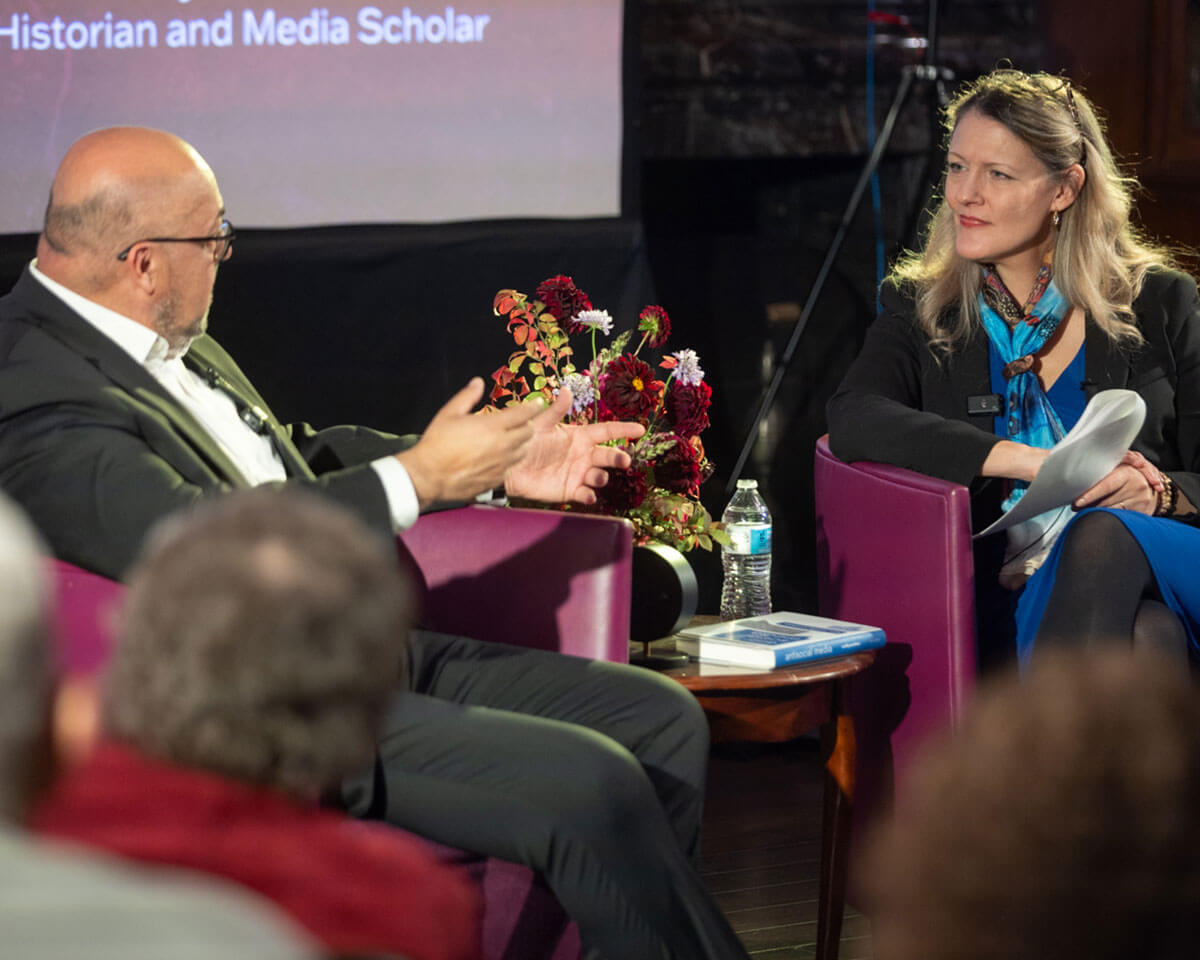Jesús Pérez ’95 hardly has time to settle into his new corner office in Roosevelt Hall, with its view of the bustle across Bedford Avenue and the West Quad. He’s bursting with ideas, and there’s no shortage of campus-based groups to reach out to, community organizations to connect with, and college services to coordinate.
In August, Brooklyn College President Michelle J. Anderson announced the opening of the new Immigrant Student Success Office (ISSO) and tapped Pérez, formerly the director of the college’s Center for Academic Advising and Student Success, to head the effort to coalesce some new, and many existing, campus programs in order to offer a one-stop-shopping experience for immigrant and first-generation students.
“We want to create a space where students feel at home, where they can connect with people who can help them with all of the challenges that come with navigating college life,” says Pérez, who came to this country from Mexico when he was nine years old. “Our main objective is to provide the necessary resources and guidance students need to graduate.”
With 38 percent of Brooklyn’s residents hailing from a foreign country, and low college completion rates for first-generation students nationally, Pérez says it would be a “educational crisis” if the college did not take steps to alleviate some of the barriers to higher education for a large segment of the local population.
“Part of our core mission is a commitment to educate the diverse communities that make up our city and state,” adds President Anderson.
It is a long-standing commitment at Brooklyn College that has paid many dividends. A graduate from the 1930s who went on to become an endocrinologist, and the daughter of Jewish immigrants from Europe, Estelle Ramey ’36 rose to national prominence when her self-described “sharp tongue” led her to pen a widely-circulated letter to a congressman who said that women were unfit for important jobs because of raging hormones. Raul Hilberg ’48, an Austrian immigrant, became one of the world’s preeminent scholars on the Holocaust.
More recently, a poet and refugee from Vietnam, Ocean Vuong ’12—who was the first in his family to learn to read, at age 11—was awarded a 2019 MacArthur “genius grant.” Two of Brooklyn College’s three Rhodes Scholars are immigrants—Zujaja Tauqeer ’11 from Pakistan and Eugene Shenderov ’05 from the former Soviet Union. (The other, Lisette Nieves ’92, is from Puerto Rico.) Of the college’s previous two finalists for the prestigious award, Sofia Ahsanuddin ’16 emigrated from India and Peter Lee ’17 is the son of Chinese migrants. Indeed, the list of accomplished immigrant and first-generation alumni is distinguished and includes elected officials, college professors, celebrated authors, and economists.
In a college that’s home to students from 139 countries, “we have the opportunity to do something here that’s really different,” says Carolina Bank Muñoz, a sociology professor and Chilean immigrant who has served as a mentor to many students in her 15 years at Brooklyn College.
“At colleges across the country, these kinds of centers are largely focused on Latinx students. But at Brooklyn, we have all these other groups: Caribbean, Asian, white ethnic. This is a much broader issue and I think we have a real opportunity to shift the narrative a bit to make it about a broader swath of immigrant and first-generation students,” she adds.
In fact, we have students at the college that come from such geographically disparate countries as Bangladesh and Israel. Many more are from Russia, Jamaica, Honduras, Trinidad and Tobago, Ukraine, and Pakistan, among others.
When Bank Muñoz first arrived at Brooklyn College in 2004, she served as the faculty adviser to a student club made up of mostly Caribbean students who were Dreamers.
“I know that it really makes a difference when you develop deep ties with faculty and staff on campus, someone you can trust and reach out to for any number of things. First-generation and immigrant students don’t always know to seek these things out,” says Bank Muñoz, who was part of an ad hoc group of faculty and staff members who in recent years have banded together to coordinate some services and programming for immigrant and first-generation students. That has included hosting an academic town hall, making “know your rights” cards to pass out and post around campus, compiling lists of campus, university, and other community contacts of people and groups that help immigrant populations, and conducting training sessions for faculty and staff about how to be an ally for students.
Many of those efforts will now fall under the umbrella of the new office, which was made possible by a grant from Irwin ’56 and Concepción Federman. Irwin, the son of immigrants, is a venture capitalist and a member of the Brooklyn College Foundation’s Board of Trustees.
The grant will help support the office’s operations and initiatives, which will include work that Pérez has been doing for some time, even when it was not officially part of his job duties. In his role in academic advising, he has always connected students with the resources and ties he has built over the years. Recently, he has worked with the college’s scholarships office to help coordinate its participation in the nationwide TheDream.US scholarships program, which provides up to $29,000 in college funding for Dreamers. More than a decade ago, he served as the director of a CUNY-wide task force that assembled to address the fact that the Mexican-American community was among the fastest growing in New York City but has among the lowest educational attainment rates. He has consistently made a point of working with community leaders, elected officials, and church groups.
“I’ve experienced that sense of coming to this country and starting over,” he says. “It’s always been natural for me to say, ‘How can I help?’ ”

Luz Medrano, a staff attorney from CUNY Citizenship Now!, a free legal assistance program available to CUNY students, at the Immigration Student Success Office in Roosevelt Hall.
Pérez’s first few weeks in his new post had him juggling myriad tasks, from assisting an Israeli student who needed help with class registration, to participating in CUNY’s Citizenship Day at John Jay College, and making the rounds during student club hours.
He is planning outreach to high schools and other community-based organizations for recruitment, helping to connect students with scholarships and employment opportunities, financial aid workshops, and a speaker series in which Pérez hopes to enlist alumni who can relate to the struggles of many of the students. He got some of his first recruits at the Brooklyn College Foundation’s September board meeting when he made a presentation to the trustees.
Daniel Menendez ’09, a current board member, was undocumented as a student and is now a Bank of America executive. He knows what it’s like to work off the books to pay international student tuition, to not have access to financial aid or be able to go to a bank for a loan. He hasn’t forgotten what the uncertainty feels like.
“I didn’t know if my situation would ever be fixed,” he says. “I look forward to sharing what it was like to overcome that.”
Trustee Doris Bien-Aime ’13, who was a first-generation student, is also anxious to connect with the new center, especially after hearing that the Federman funding also provides completion grants for students who have a financial hold that prevents them from graduating or registering for classes. When she was a student, she had her bursar’s hold removed after going through a series of health problems.
“It was beautiful for me to see how one act had an exponential impact not only on my ability to grow personally and professionally, but also put me in a position to pay it forward,” says Bien-Aime, who founded an annual workshop at the college to help business students transition into life after school.
Yasmin Ali ’01, ’07 M.A., the executive director of Student Financial Services, administers the grants for Brooklyn College, which she says will likely end up going to roughly 70 students each semester.
“We set up a process where they check in with financial and academic advisers to help them work on a plan to pay for the rest of their courses and to map out what courses they have left so they can finish,” says Ali, a Sudanese immigrant who came to the United States in the 1980s. “We want to help get them on track and to be able to say that this gift allowed them to graduate.
“It’s exciting to show students that Brooklyn College cares and identifies with the immigrant experience,” she says. “I’m proud to be a part of it.”
Return to the BC Magazine



